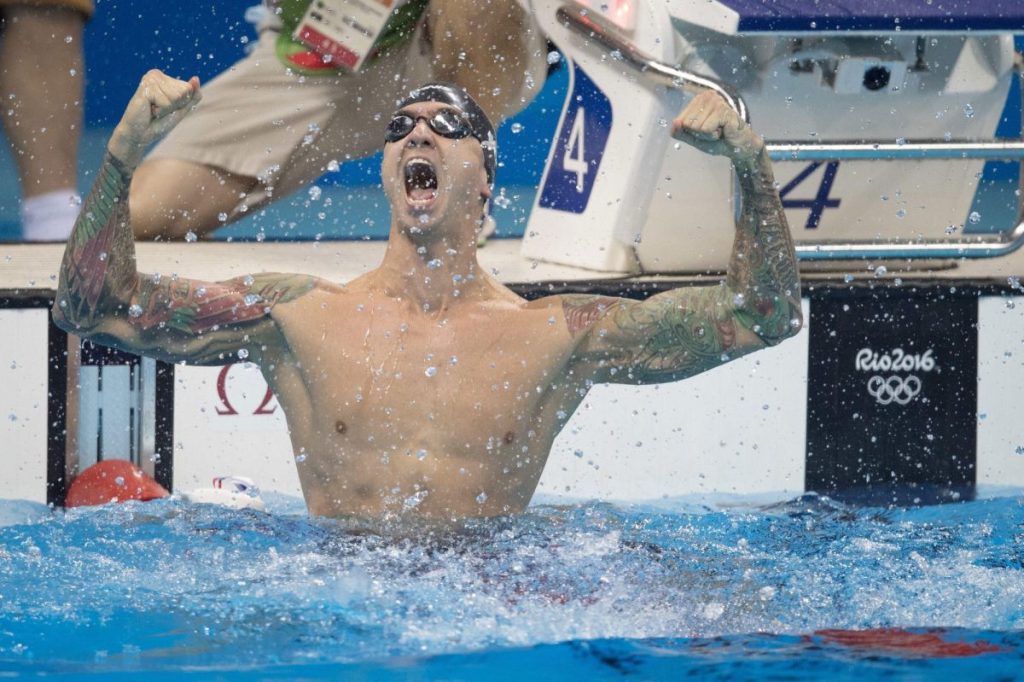There’s nothing more satisfying to watch than a good sports comeback story. For fans who tuned in to the Olympics Friday night, witnessing American swimmer Anthony Ervin win a gold medal at the age of 35—as the oldest American male individual swimmer since 1904—was a comeback for the ages.
It’s also a story that’s deeply rooted in Ervin’s spiritual journey.
35-year-old @AnthonyErvin officially becomes the oldest Olympic swimming champion. #GOLDhttps://t.co/3ULZHqPPOe https://t.co/6B65hID9FD
— NBC Olympics (@NBCOlympics) August 13, 2016
Ervin was just 19 when he burst onto the scene at the 2000 Sydney Olympics, winning the gold medal along with fellow American Gary Hall Jr. when the two tied for first in the 50-meter freestyle with a time of 21.98 seconds.
After Sydney, Ervin’s future in swimming looked extraordinarily bright, but things didn’t quite turn out as planned. Ervin would retire from competitive swimming just four years later at the age of 22—just when most other athletes are reaching their physical peak.
Just a glance at the cover of the swimmer’s recently published memoir Chasing Water: Elegy of an Olympian, reveals the intensity of Ervin’s career to date. He’s seen looking straight at the reader while in the full lotus pose underwater in a pool. Other swimmers are racing behind him, but Ervin doesn’t see them. The message the reader receives is clear: Anthony Ervin is focused on more than the competition.
While many profiles published since his win on Friday have noted that Ervin “dabbled” in Buddhism, the term does a disservice to the role Buddhism has played in his life and choices.
Here’s everything you need to know about Ervin’s journey back to the Olympic stage and what Buddhism had to do with it:
He sometimes struggled with the expectations placed on him:
The son of a Jewish mother and an African American father, Ervin was hailed in Sydney for becoming the first American of African descent to win a gold medal in swimming by NBC broadcaster Jim Gray. It was a label that often made him uncomfortable. “I didn’t know a thing about what it was like to be part of the black experience,” he told Rolling Stone many years later. “But now I do. It’s like winning gold and having a bunch of old white people ask you what it’s like to be black. That is my black experience.”
It took years for him to find his path:
When Ervin decided to retire instead of training for the 2004 Olympics, some in the swimming community thought he was merely suffering from burnout. The truth was far more complicated (and troubling). Ervin was diagnosed with Tourette’s Syndrome as a child, and writes in his book that he stopped taking his medication shortly after winning in Sydney. Self-destructive behavior, addiction, and homelessness followed. “We were concerned, because Anthony wasn’t taking care of himself,” his sister-in-law Theresa told Ervin’s co-author, Constantine Markides. “He wasn’t bathing. He wasn’t washing his clothes, wasn’t paying attention to if he ate or not.” He would later reveal he also attempted suicide during this time. It was clear that a major change was needed.
Meditation helped him focus and want to give back:
In 2001, while he was still actively racing, Ervin began meditating at a local Zen temple. He credits the meditation for helping him focus more during events.
He would later return to meditating as he pulled himself out of his slide, even living inside a Zen temple for a period. One of the most moving passages in his memoir occurred when he encountered a kind stranger while meditating.
“During one seated meditation tears started running down my cheeks,” he writes. “I don’t wipe them until after the gong sounds. A woman who has also been meditating walks over to me. She smiles and hands me a necklace of wooden prayer beads on a string. Then she walks away.”
Later, as Indonesia was recovering from the devastation of the 2004 tsunami, Ervin would auction off his Sydney gold medal and donate the $17,101 in proceeds to relief efforts. His thought process behind the decision hints at the influence Buddhism had on him. “Even with all my vaunted talent, facing that wall of water, I would have died as well,” Ervin said in a 2012 interview. “In order to kind of cleanse myself, I wanted to do something I thought would help, to kind of give myself away.”
Damn, Anthony Ervin. This is one hell of a thing he wanted to pass along to his newborn daughter he hasn't met. pic.twitter.com/lAH2YpBV8E
— Jeff Passan (@JeffPassan) August 13, 2016
Thank you for subscribing to Tricycle! As a nonprofit, we depend on readers like you to keep Buddhist teachings and practices widely available.
